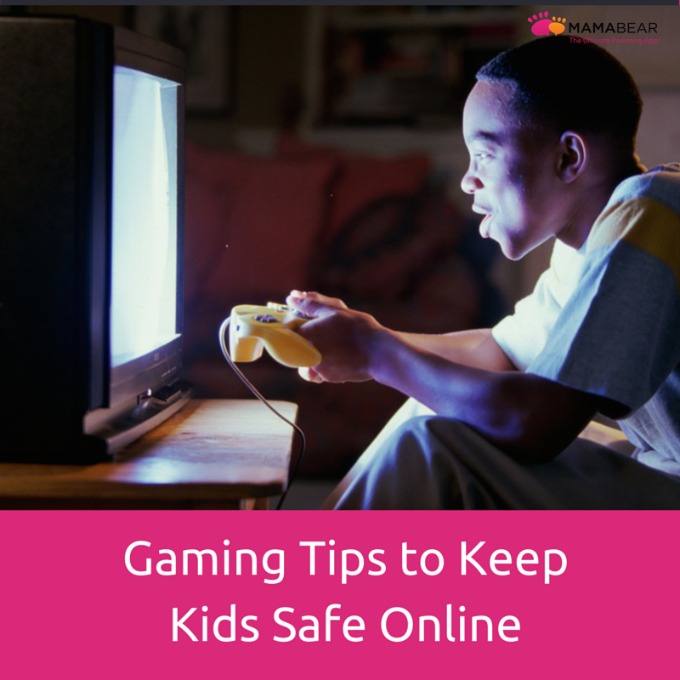
Image source: https://mamabearapp.com/wp-content/uploads/2015/02/online-gaming-safety-tips.jpg
In fact, online gaming is rife with risks that your young one could easily fall into. Internet security firm Kaspersky conducted a study of 11- to 16-year-olds and found a worrying statistic: 20 percent of the children they interviewed admitted that they trusted gaming platforms so much that they would not have a problem with meeting their gaming contacts in real life.
In addition, 38 percent of the child respondents revealed they had encountered people pretending to be someone else while gaming and 23 percent had been asked suspicious questions. These numbers are enough to make any parent feel anxious about letting their child anywhere near a device that allows them to play games. But it is still possible to let kids have their fun while staying safe. As soon as your child starts playing games online, set down these rules and enforce them consistently.
1. Educate Them On The Dangers
Education is key to online safety, so make sure that you and your child are aware of the possible dangers one may encounter in online gaming. These include cyber-bullying, harassment, stalking, scams, viruses and malware, exposure to inappropriate content, and vulnerability to criminals such as hackers and pedophiles. First understand how these dangers can occur and how to avoid them, then discuss the dangers in an appropriate way with your child.
Further, stay as updated as you can. The internet changes all the time, which means there could be new ways for online gamers to be at risk. Software chief executive Franois Amigorena cites an example: A school figure from the library informed my children that all .org domains are safe. Which was once the case as it was created for non-profits, but now they can be registered by anyone; just put any rude word in between www. and .org.
2. Be Careful With In-Game Chat & Messaging
A major feature of modern gaming platforms is allowing players to connect with others around the world. For example, platforms like Minecraft and Roblox serve as sandbox worlds where each player can build virtual things while socializing with other players online. Meanwhile, videogames like NBA 2k17 and Portal 2 have a multiplayer mode to form teams with other active players. To allow this, many apps and gaming consoles have communication features such as instant messaging, voice calls, and video chats. In other words, they allow kids to talk to anyone in the world.
Here is where you should set limits for your children. Remind them not to accept contact requests or gifts from strangers, and to never send any private material to anyone. Also let them know that when someone says anything that makes them feel uncomfortable, they can come to you or even go ahead and block that person right away. Also, do random checks of their chat history, or another option is you simply have a rule where they are not allowed to use the chat option in any game they play.
3. Keep Kids Within View While They Are Playing
A straightforward solution to ease your anxieties on your kids online gaming is to get them to play within your view. Security experts recommend setting up kids consoles in a communal area such as the living room, instead of in the privacy of their bedrooms. That way, you can see and hear the nuances of your childrens gaming behavior as well as that of the people they play with.
4. Ensure Parental Controls Are Switched On
Regardless of whether your child plays on a console such as Xbox or PlayStation, or on a personal computer, or even on a mobile device such as an iPad or iPhone, there is almost always a way to apply parental controls. Most consoles and gaming computers have built-in security settings, so take the time to tinker with these. Popular kids games like Roblox and others also have security settings which you need to get familiar with.
Further, you can install trusted third-party apps and software for full-featured parental control programs. Parenting editor Caroline Knorr names NetNanny and Qustodio as some of the programs that lets you block websites and online apps, enforce screen-time limits, and monitor your childs online activity.
You can discuss these parental control methods with your kids so that they dont feel like you are being a draconian dictator towards them. Let them understand why these settings are needed, and that they can talk to you if they feel that these should be adjusted.
5. Constantly Be Communicating
Open communication between you and your child is one of the most vital elements of staying safe. Your child should be able to tell you right away when someone or something feels off during an online game. In addition, stay in-the-know about your childs online contacts a simple How is your online team or clan doing? can start a conversation about the people your child is interacting with.
Most of all, make sure your young one feel comfortable talking to you, without you automatically dismissing their online games as evil. Children often need help in articulating their sentiments or explaining an event, so encourage them to keep talking to you. The important thing is that they see you as a trustworthy and nonjudgmental adult, while also being someone who keeps them safe.

